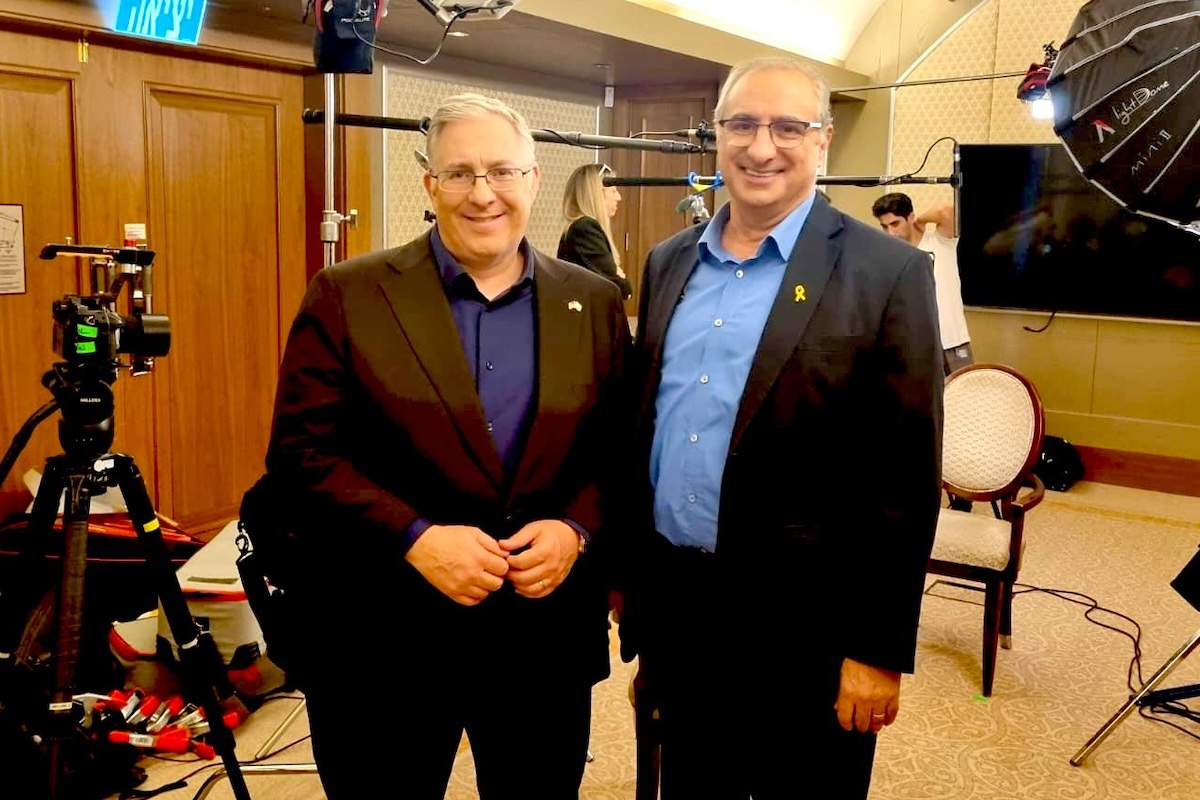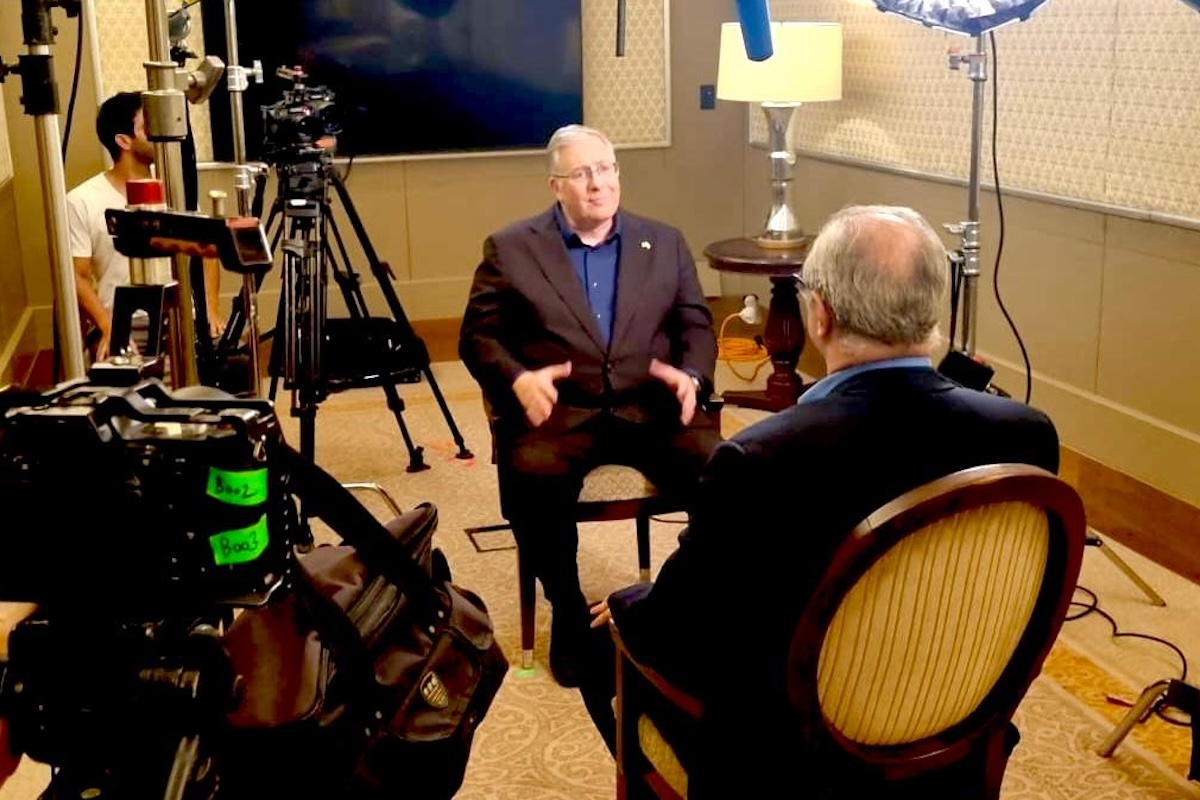Does Gaza War impact relations within Abraham Accords nations? Joel Rosenberg asks Eitan Na'eh, Israel’s ambassador to Bahrain
Meet Israeli ambassador Na'eh, who quotes the Book of Ezekiel to describe the future of regional relationships

When the Hamas army of terror invaded Israeli territory and carried out its brutal, unspeakable atrocities on Oct. 7, Israel was reportedly on the brink of making another historic breakthrough in the region: A peace deal with the Kingdom of Saudi Arabia. While the normalization process now appears to be stuck, Israel’s Abraham Accords treaty with the United Arab Emirates, Bahrain and Morocco – so far, still holds.
How come?
And regardless, is there any significant impact for more than eight months of negative headlines about Israel’s conduct in the Arab media?
Joel Rosenberg, ALL ISRAEL NEWS editor-in-Chief and host of THE ROSENBERG REPORT on TBN, sat down with Israel’s ambassador to Bahrain, Eitan Na'eh, to discuss the high stakes of the ongoing war for regional relations.

“The October 7th did not blow up the relationships,” Na’eh told Joel at the annual Jerusalem Prayer Breakfast in early June.
“Nobody is happy with the situation. Neither them nor us,” he referred to the moderate leaders in the Gulf. “I think that we have challenges. Yes, it's delaying things. I'm here in Jerusalem… But I think that the interests are there… to build long-standing partnerships and relationships.”
Na’eh agreed with Rosenberg, who defined the war in Gaza as the “ultimate test of whether these accords can withstand the dangers of the region.”
He praised the leaders of the UAE and Bahrain for their “clear vision of how relationships should look like” and their “ability to look beyond the horizon and beyond what is happening today.” Their bravery, he said, is, at times, demonstrated against an uneasy populist public opinion and deserves much appreciation.
“Bahrain is a small country, but because of that, one should appreciate the bravery of them joining the UAE and forging relationships with Israel,” the ambassador stressed.
Na'eh was the Israeli diplomat who opened up the first Israeli embassy in the United Arab Emirates, shortly after the Abraham Accords were signed in September 2020. Then the Israeli government transferred him to Bahrain to open the first-ever Israeli embassy there.
His years-long career at Israel’s Foreign Ministry also brought Na'eh to Turkey, where he became one of the few Israelis who have actually ever met Turkish President Recep Tayyip Erdoğan.
Throughout the war, Erdoğan has declared very aggressive statements against Israel and its leaders. He called Prime Minister Netanyahu a “bloodthirsty genocidal vampire” and called on the Islamic world to unify and take action against Israel.
When asked by Rosenberg to comment on these remarks, Na’eh replied diplomatically and said: “Erdoğan is Erdoğan, and we know who he talks to. We know what his vision is and what he would like to achieve. Unfortunately, it’s not compatible with ours, and we’ll leave it to that.”

In May 2021, at the height of a different round of fighting between Israel and Gaza, he visited the UAE and had an opportunity to speak with young Emiratis. While he was speaking, a TV screen in the room showed what was happening in Gaza on Sky News Arabia.
“And they said, ‘But you know what, ambassador? This is the first time that we get to hear the other side,’” Na’eh recounted. “So things don't change overnight. That's a fairy tale. We have to build the relationships and know how to define exactly what we want to achieve and how to get there. To prioritize, and to work hard and understand that we need a lot of patience. The key word here is patience.”
Even though Na’eh, himself, is not a particularly religious person, he chose to invoke a verse from the Book of Ezekiel to describe his vision for the future of regional relationships.
“Ezekiel 27, verse 20, actually talks about trade in those days, sixth century B.C. – that’s 2,600 years ago,” he told Rosenberg. It mentions financial relations between Israel and the countries of the Levant (today’s Syria and Lebanon) and the princes and presidents of Arabs.
“That was history. It's amazing. They traded in Jerusalem,” Na’eh explained. “They drank here wine during the King of Judea's time, that was mixed with vanilla. That vanilla was brought from India. So, what we're doing now in my vision… is to reconnect. There was a disconnect and we reconnect India to the Mediterranean and from here to the West and vice versa. And, will happen one day when we normalize with Saudi. And I didn't say ‘if’ – I said ‘when.’ It's a matter of time.”
“Dedan was thy merchant in precious clothes for chariots. Arabia, and all the princes of Kedar, they occupied with thee in lambs, and rams, and goats: in these were they thy merchants.
The merchants of Sheba and Raamah, they were thy merchants: they occupied in thy fairs with chief of all spices, and with all precious stones, and gold.
Haran, and Canneh, and Eden, the merchants of Sheba, Asshur, and Chilmad, were thy merchants.
These were thy merchants in all sorts of things, in blue clothes, and broidered work, and in chests of rich apparel, bound with cords, and made of cedar, among thy merchandise.” - Ezekiel 27, verses 20-24.
THE ROSENBERG REPORT airs Thursday nights at 9 p.m. EST and Saturday nights at 9:30 p.m. EST – on the Trinity Broadcasting Network (TBN), the most-watched Christian television network in the United States.

The All Israel News Staff is a team of journalists in Israel.
You might also like to read this:














